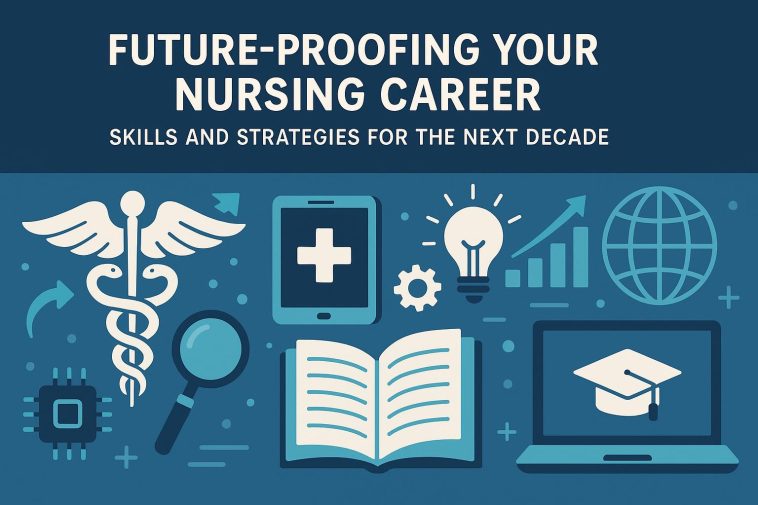Key Takeaways
- Embrace technological advancements to enhance patient care and improve outcomes.
- Develop cultural competency to effectively serve diverse populations.
- Strengthen leadership and collaboration skills for interdisciplinary teamwork.
- Enhance critical thinking and problem-solving abilities.
- Build emotional intelligence and resilience to manage workplace stress.
- Stay informed about regulatory and policy changes affecting nursing practice.
The future of nursing is shaped by rapid advances in medicine, changes in patient demographics, and the evolution of healthcare policies. Nurses are expected not only to deliver compassionate care but to remain resilient and competitive as the landscape shifts—especially in Ohio, where demand is high for those with advanced skills. Exploring online nurse practitioner programs Ohio can be a smart step for registered nurses seeking increased autonomy and career flexibility. By making intentional choices now, nurses can lay the groundwork for a fulfilling and enduring career, regardless of how the industry evolves.
Staying ahead means embracing new technologies, developing emotional intelligence, adapting to regulatory reforms, and being equipped to work with increasingly diverse patient populations. For today’s healthcare professional, lifelong learning and proactive skill development are not just beneficial—they are essential for thriving in a changing environment.
This article provides actionable strategies and highlights the core competencies that enable nurses to excel in both established and emerging roles. From mastering digital health tools to advocating for patients in policy debates, taking a future-focused approach ensures that every nurse can continue to make a meaningful impact.
By understanding the major trends shaping healthcare and prioritizing the right skills, including those cultivated at institutions like Youngstown State University, you will be ready for a wide range of opportunities—from clinical practice to leadership positions—over the next decade.

Embracing Technological Advancements
Technology is transforming every aspect of healthcare. From the proliferation of telehealth and electronic health records (EHRs) to the integration of artificial intelligence, nurses must stay ahead of the curve in terms of digital proficiency. Learning to use EHRs efficiently not only streamlines workflow but also reduces errors and enhances patient safety. Virtual reality and simulation-based training facilitate the acquisition of new clinical skills in low-risk settings. Meanwhile, telemedicine platforms are expanding access to care, making it easier for patients to connect with providers regardless of geographical barriers.
As artificial intelligence and predictive analytics become more common in monitoring patient data, nurses with strong quantitative and digital skills are in greater demand. These tools help identify potential complications early, enabling more personalized care. According to the American Medical Association, nurses who proactively embrace technological growth not only improve patient outcomes but also enhance their own job satisfaction.
Developing Cultural Competency
America’s population is growing more diverse every year, requiring healthcare providers to be sensitive to differences in language, traditions, and health beliefs. Cultural competency enables nurses to build trust and communicate more effectively with patients from diverse backgrounds. By understanding and respecting patients’ preferences, nurses can help reduce health disparities and contribute to more equitable outcomes. This skill set is especially vital in community health, family practice, and public health roles.
Professional workshops, continuing education courses, and interactions with peers can all support nurses in growing their cultural awareness. Research indicates that culturally competent care is directly correlated with improved patient satisfaction scores and better health outcomes.
Strengthening Leadership and Collaboration
Nurses today are integral members of interdisciplinary teams and are increasingly taking on leadership responsibilities in both clinical and administrative settings. Effective leaders motivate their teams, advocate for their patients, and drive quality improvement initiatives. Developing leadership skills, such as mentorship, conflict resolution, and strategic planning, opens doors to new career opportunities and supports organizational success.
Interdisciplinary Collaboration
Nurses collaborate daily with physicians, pharmacists, therapists, and support staff to ensure comprehensive patient care. Fostering open communication and mutual respect enables better coordination, reduces mistakes, and leads to improved outcomes. Training in interprofessional skills, such as joint decision-making and collaborative problem solving, is highly valued in today’s team-oriented healthcare landscape.
Enhancing Critical Thinking and Problem-Solving
Critical thinking is the backbone of strong nursing practice. Nurses must continually assess patient conditions, interpret lab results, and anticipate complications. Decision-making under pressure requires the ability to process information rapidly and prioritize interventions accordingly.
Participation in simulation labs, clinical rotations, and case-based learning can sharpen analytical skills and prepare nurses for the unexpected challenges they may encounter. As the healthcare environment grows more complex, those who can think critically and act decisively will be best positioned for advancement.
Building Emotional Intelligence and Resilience
The emotional demands of nursing can be intense. Nurses face life-and-death decisions, support patients and families through trauma, and must constantly juggle competing priorities. Emotional intelligence—the ability to recognize, understand, and manage one’s own emotions and those of others—is vital for maintaining professionalism and empathy.
Regular self-care practices, mindfulness training, and strong support networks are keys to building resilience in the face of stress. Organizations that promote mental wellness and peer support programs help nurses avoid burnout and remain engaged in their work. A focus on mental health and emotional regulation not only improves caregiver well-being but also benefits patients, as emotionally intelligent nurses foster more positive therapeutic relationships.
Staying Informed About Regulatory Changes
Healthcare policies and regulations are constantly evolving, influencing every aspect of nursing practice. Whether it’s state scope-of-practice laws, federal guidelines for reimbursement, or new patient safety standards, staying up to date is essential for legal and ethical practice. Nurses who are well-versed in current regulations safeguard their patients and themselves from adverse outcomes.
Participation in professional organizations, ongoing education, and policy discussions allows nurses to stay informed and take an active role in shaping the future of healthcare. Being an advocate—at the bedside and in legislative arenas—ensures that the nursing voice is heard in decision-making processes that impact patient care.
With proactive preparation, dedication to lifelong learning, and a commitment to advancing core competencies, nurses can secure resilient and rewarding careers, continuing to deliver high-quality, patient-centered care for decades to come.




